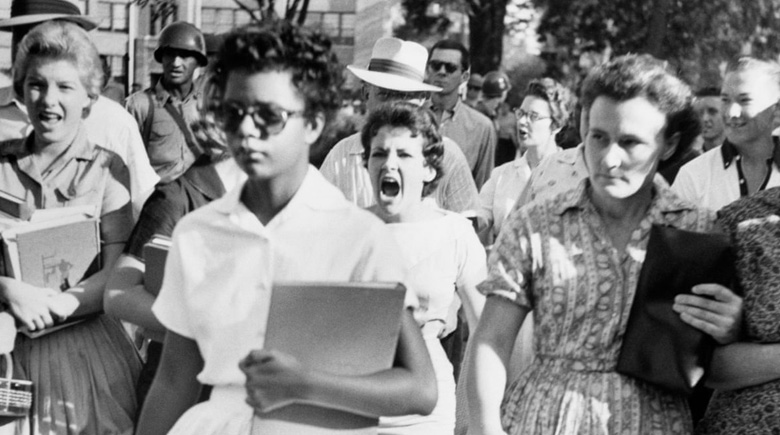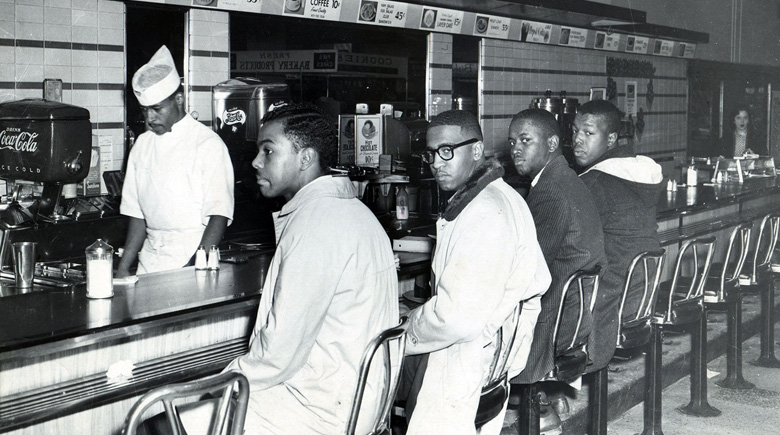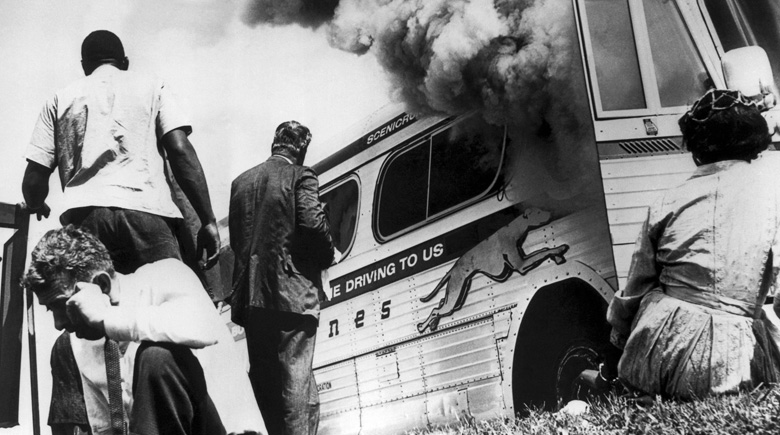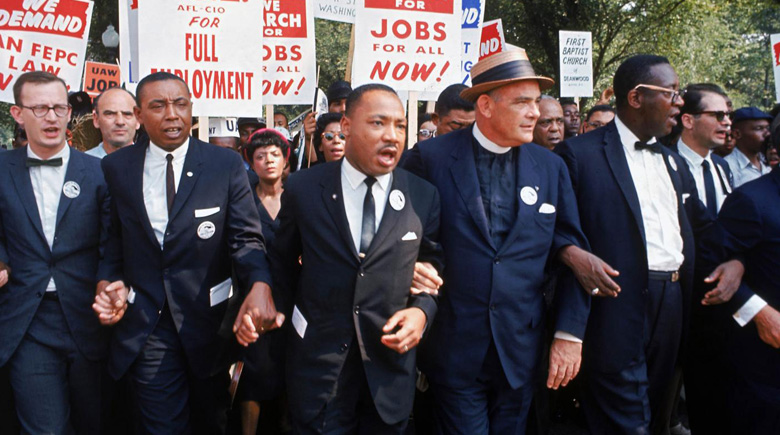Solidarity in Diversity
Celebrating the life and legacy of Martin Luther King, Jr.
Presented by the Three Rivers Area Faith Community, a multiracial coalition of churches and organizations in Three Rivers, Michigan, as part of our annual celebration of the life and legacy of Dr. King. Print versions of the timeline below are in display in downtown Three Rivers storefront windows from January 18, 2021 through the end of February 2021.
1929-1954

Jan 15, 1929: Martin Luther King, Jr. is born in Atlanta, Georgia.
Feb 25, 1948: King is ordained and becomes assistant pastor at Ebenezer Baptist Church in Atlanta, his father’s church.
Jun 8, 1948: King graduates from Morehouse College with bachelor’s degree in sociology at age 19.
May 8, 1951: King graduates as valedictorian from Crozer Theological Seminary in Chester, Pennsylvania, with bachelor of divinity degree.
Jun 18, 1953: King and Coretta Scott are married near Marion, Alabama. King’s father officiates at the service.
May 17, 1954: Supreme Court decides Brown vs. Board of Education, declaring segregation in public schools unconstitutional.
Sep 1, 1954: King begins his pastorate at Dexter Avenue Baptist Church in Montgomery, Alabama.
1955

Jun 5: King earns doctorate from Boston University.
Aug 28: Emmett Till, a 14-year-old boy from Chicago, is brutally murdered in Mississippi.
Dec 1: Rosa Parks refuses to give up her seat to a white man on a bus in Montgomery, Alabama.
Dec 5: King is named president of the Montgomery Improvement Association to help oversee the Montgomery Bus Boycott, an effort to integrate public transportation.
1956
Jan 30: King’s home is bombed while he is speaking at a meeting. His wife and daughter are unharmed.
1957

Jan 10: King is named chairman of what becomes the Southern Christian Leadership Conference (SCLC), an effort to coordinate nonviolent protests against racial discrimination and segregation.
May 17: King delivers his first national address, “Give Us the Ballot,” at the Prayer Pilgrimage for Freedom at the Lincoln Memorial in Washington.
Sep 4: Nine black students known as the “Little Rock Nine” are blocked from integrating Little Rock Central High School in Little Rock, Arkansas. President Eisenhower eventually sends federal troops to escort the students.
Sep 9: President Eisenhower signs the Civil Rights Act of 1957, which allows federal prosecution of those who suppress another’s right to vote.
1958
Sep 20: At a book signing in Harlem, King is stabbed with a letter opener by a mentally ill woman. Doctors remove the seven-inch blade from his chest.
1960

Feb 1: King moves from Montgomery to Atlanta to focus on the civil rights struggle.
Feb 1: Four black college students refuse to leave a “whites only” lunch counter in a Woolworth’s in Greensboro, North Carolina. The demonstration sparks similar sit-ins in other stores and other states.
Oct 19: King is arrested at a sit-in demonstration at an Atlanta department store. He is sentenced to four months of hard labor — for violating a suspended sentence in a 1956 traffic violation. He is released on $2,000 bond.
Nov 14: Nine-year-old Ruby Bridges is escorted by federal marshals as she becomes the first student to integrate William Frantz Elementary School in New Orleans, Louisiana.
1961

1961: Throughout 1961, black and white activists, known as Freedom Riders, took bus trips through the American South to protest segregated bus terminals and attempted to use “whites only” restrooms and lunch counters. The Freedom Rides were marked by horrific violence from white protestors and drew international attention to the cause of civil rights.
Dec 16: King and hundreds of others are arrested in desegregation campaign in Albany, Georgia.
1962
Jul 27: King is arrested at a prayer vigil in Albany and spends two weeks in jail.
Sep 28: A member of the American Nazi Party assaults King at an SCLC conference in Birmingham, Alabama.
1963

Apr 16: After being arrested for ignoring an Alabama state court injunction against demonstrations, King writes his famous Letter from a Birmingham Jail, a defense of nonviolent resistance to racism.
Aug 28: King delivers his “I Have a Dream” speech at the Lincoln Memorial as more than 250,000 people take participate in the March on Washington for Jobs and Freedom.
Sep 15: Four girls are killed when a bomb explodes at the 16th Street Baptist Church in Birmingham, Alabama. King delivers the eulogy for three of the slain girls three days later.
1964
Jun 11: King and 17 others are jailed for trespassing after demanding service at a whites only restaurant in St. Augustine, Florida.
Jul 2: President Johnson signs the Civil Rights Act of 1964, preventing employment discrimination due to race, color, sex, religion or national origin.
Dec 10: King wins Nobel Peace Prize.
1965

Mar 7: Local police block and brutally attack marchers led by John Lewis and others on the Edmund Pettis Bridge in Selma, Alabama, as they attempted to walk to the state capital in protest of black voter suppression. The day is remembered as Bloody Sunday.
Mar 17-25: After successfully fighting in court for their right to march, King and other civil rights leaders complete the Selma to Montgomery March with 600 marchers, reaching the Alabama capital on March 25.
Aug 6: President Johnson signs Voting Rights Act of 1965, aiming to overcome legal barriers at the state and local levels that prevented African Americans from exercising their right to vote as guaranteed under the 15th Amendment to the U.S. Constitution.
Aug 11: Rioting in the Watts section of Los Angeles leads King to address economic inequality.
Aug 12: King gives his first speech against the Vietnam War.
1966

Jan 26: King and his wife move into a Chicago housing project to demand better housing and education in northern U.S. cities.
Aug 5: Over 700 white protestors swarmed marchers—hurling bricks, bottles, and rocks—during a march for housing in Chicago. King is struck in the head by a rock.
1967

Apr 4: In speech at a New York City church, King demands U.S. make greater effort to end Vietnam War.
Dec 4: King unveils plans for a Poor People’s Campaign, a mass civil disobedience protest, for the spring in Washington. It was intended as an expansion of his civil rights activities into the area of economic rights.
1968

Mar 23: King leads 6,000 protesters in support of striking sanitation workers in Memphis. The march ends with violence and looting.
Apr 3: King returns to Memphis, intending to lead a peaceful march. At an evening rally, he delivers his final speech, “I’ve Been to the Mountaintop.”
Apr 4: King is shot and killed on the balcony of the Lorraine Motel.
Apr 9: King is buried in Atlanta.
Apr 11: President Johnson signs the Fair Housing Act, providing equal housing opportunity regardless of race, religion or national origin.
Three Rivers Area Faith Community
- Ambassadors For Christ Church
- Bethel Baptist Church
- Center Park United Methodist
- *culture is not optional / The Huss Project
- First Presbyterian Church
- Florence Church of the Brethren Mennonite
- Grant Chapel AME Church
- New Creation In Christ Ministries
- New Jerusalem Baptist Church
- St. John’s Lutheran Church
- Three Rivers First United Methodist Church
- Trinity Episcopal Church
Recommended Viewing
Recommended Reading
- A Testament of Hope: The Essential Writings and Speeches by Martin Luther King, Jr.
- March Graphic Novel Series (Book One, Book Two, Book Three) by John Lewis, Andrew Aydin and Nate Powell
- Martin Luther King: The Inconvenient Hero by Vincent Harding
- To Shape a New World: Essays on the Political Philosophy of Martin Luther King, Jr. Edited by Tommie Shelby and Brandon M. Terry
- Martin & Malcolm & America: A Dream or Nightmare? by James Cone
- The Sword and the Shield: The Revolutionary Lives of Malcolm X and Martin Luther King, Jr. by Peniel E. Joseph
- A More Beautiful and Terrible History: The Uses and Misuses of Civil Rights History by Jeanne Theoharis
- Breaking White Supremacy: Martin Luther King Jr. and the Black Social Gospel by Gary Dorrien
- Bearing the Cross: Martin Luther King, Jr., and the Southern Christian Leadership Conference by David Garrow
- A Force More Powerful: A Century of Nonviolent Conflict by Peter Ackerman and Jack DuVall
- The Beloved Community: How Faith Shapes Social Justice, From the Civil Rights Movement to Today by Charles Marsh
- There Is a River: The Black Struggle for Freedom in America by Vincent Harding
- The Color of Compromise: The Truth about the American Church’s Complicity in Racism by Jemar Tisby
What is your part in this story? How are you contributing to the ongoing freedom movement?
*cino network
Connect
Mailing address *culture is not optional P.O. Box 1 Three Rivers, MI 49093
The Huss Project 1008 8th St. Three Rivers, MI 49093
